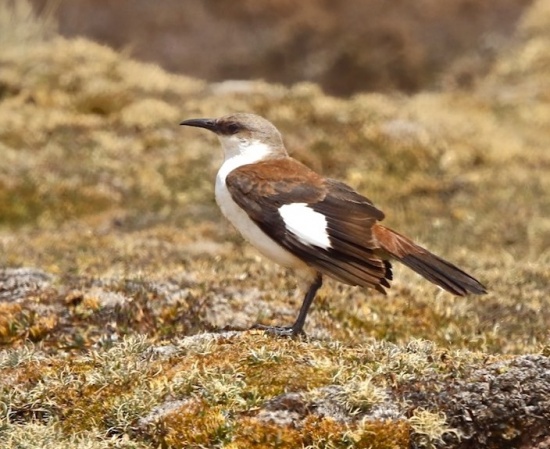(Clearer image showing wing bar) |
(Imp sizes. Attempt to disguise copied text. Some extra info. References updated) |
||
| Line 4: | Line 4: | ||
==Identification== | ==Identification== | ||
| − | + | 23–24 cm (9-9½ in) | |
| + | *Pale brownish-grey head and face | ||
| + | *Black [[Topography#Heads|lores]] | ||
| + | *Dark ear-[[Topography#General Anatomy|coverts]] | ||
| + | *Brownish-rufous upperparts | ||
| + | *Black wings with broad, white wingbar | ||
| + | *Black tail with white tips to outer [[Topography#Tails|rectrices]] | ||
| + | *White underparts | ||
| + | *Dusky legs and bill | ||
==Distribution== | ==Distribution== | ||
| − | + | [[South America]]: found in the Andes of central [[Peru]] (Junín, Lima and Huancavelica). | |
==Taxonomy== | ==Taxonomy== | ||
This is a [[Dictionary_M-O#M|monotypic]] species | This is a [[Dictionary_M-O#M|monotypic]] species | ||
==Habitat== | ==Habitat== | ||
| − | Mineral-rich, well-watered cushion-plant bogs with rocky outcrops and stony slopes nearby, often below glaciers (so obviously high elevation). | + | Mineral-rich, well-watered cushion-plant bogs with rocky outcrops and stony slopes nearby, or adjacent puna grassland, often below glaciers (so obviously high elevation). |
==Behaviour== | ==Behaviour== | ||
| − | + | ====Diet==== | |
| + | Their diet consists mostly of invertebrates, with worms recorded as being included. One was also observed eating a small frog. | ||
| + | ====Breeding==== | ||
| + | A nest recorded was placed between rocks and was made from plant material and feathers. | ||
==References== | ==References== | ||
| − | #{{Ref- | + | #{{Ref-Clements6thAug17}}#Handbook of the Birds of the World Alive (retrieved Nov 2017) |
| + | #BirdLife International | ||
{{ref}} | {{ref}} | ||
==External Links== | ==External Links== | ||
Revision as of 01:48, 5 November 2017
- Cinclodes palliatus
Identification
23–24 cm (9-9½ in)
- Pale brownish-grey head and face
- Black lores
- Dark ear-coverts
- Brownish-rufous upperparts
- Black wings with broad, white wingbar
- Black tail with white tips to outer rectrices
- White underparts
- Dusky legs and bill
Distribution
South America: found in the Andes of central Peru (Junín, Lima and Huancavelica).
Taxonomy
This is a monotypic species
Habitat
Mineral-rich, well-watered cushion-plant bogs with rocky outcrops and stony slopes nearby, or adjacent puna grassland, often below glaciers (so obviously high elevation).
Behaviour
Diet
Their diet consists mostly of invertebrates, with worms recorded as being included. One was also observed eating a small frog.
Breeding
A nest recorded was placed between rocks and was made from plant material and feathers.
References
- Clements, J. F., T. S. Schulenberg, M. J. Iliff, D. Roberson, T. A. Fredericks, B. L. Sullivan, and C. L. Wood. 2017. The eBird/Clements checklist of birds of the world: v2017, with updates to August 2017. Downloaded from http://www.birds.cornell.edu/clementschecklist/download/
- Handbook of the Birds of the World Alive (retrieved Nov 2017)
- BirdLife International
Recommended Citation
- BirdForum Opus contributors. (2024) White-bellied Cinclodes. In: BirdForum, the forum for wild birds and birding. Retrieved 29 April 2024 from https://www.birdforum.net/opus/White-bellied_Cinclodes




